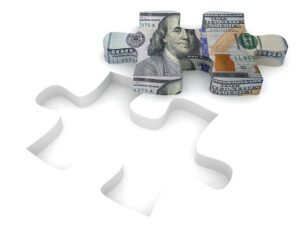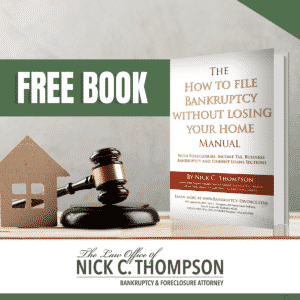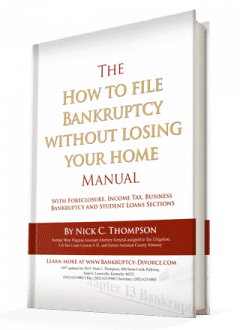Reasonable and Necessary expenses are often forgotten when you plan your Chapter 13 budget. Take a moment to think about how to live on a Chapter 13 budget. Two common things can cause Chapter 13 cases to fail. First, the plan payments might become unaffordable. Conditions can change and increase your expenses. When the plan payments are not paid, the Louisville Trustee files a motion to dismiss the case for not making payments.
Second, if a secured creditor like a home mortgage is not paid, the creditor can file a motion to terminate the stay to foreclose a home or repossess an auto. Conditions may not change but you can also forget that you need to include day care expenses if you are expecting an addition to the family. So, to qualify for a Chapter 7 or file a Chapter 13, you need to get an affordable Chapter 13 budget or Chapter 7 budget.
How Live on a Chapter 13 Budget
When a creditor files a motion to terminate the stay in Chapter 13, the Debtor has to pay what the bank paid to file the motion. This is about $400 in filing fees and $1000 in bankruptcy attorney fees. That is a huge and unfortunate fee for being late with a payment.
If the plan is unaffordable, Chapter 13 will fail. Whatever strategy you use, your budget must include your expenses to make Chapter 7 or 13 possible and affordable. In Chapter 13, you have to afford the payments for 3-5 years. Similarly, in Chapter 7, you have to afford the home or car to reaffirm it.
Interestingly, there are three things that increase Chapter 13 plan payments, and two things that decrease them.
1. Decrease in Net Income Disposable income plans
When your net income is too high, it forces you to file a Chapter 13 due to the means test. Remember, there are two parts to the means test. Just because you make $150,000 a year doesn’t mean you can’t file a Chapter 7. If your expenses give you little or no net income, your Chapter 13 plan payments decrease, or you can file Chapter 7. Usually, the more you earn, the higher your Chapter 13 plan payments will be. However, if you include expenses and file your bankruptcy while your income is low, you can get a Chapter 7 or a more affordable Chapter 13 monthly budget.
Reasonable and necessary expenses are deductions from your income. If reasonable and necessary expenses leave nothing for a Chapter 13 plan payment, you may not be required to file Chapter 13. Or, your Chapter 13 plan payment may repay little to the unsecured debts.
I often need to remind someone that they need an auto to drive to work during a 5-year plan. If they have no car payment and their auto has 300,000 miles, they might need to purchase an auto before filing Chapter 13. Then, if they had a $700 disposable income before, that payment may now include a $500 per month auto payment, and the unsecured claims only get $200.
 2. Decrease in Assets Asset driven plans
2. Decrease in Assets Asset driven plans
Every Chapter 13 has to pay back what Chapter 7 would have repaid. If you’re a couple that owns a $150,000 home with no mortgage, then your repayment plan is about $100,000. Each Debtor gets a $25,000 exemption for a home. You don’t get to file Chapter 7 and keep $100,000 in equity. But you can decrease your equity by spending the asset or spending down the equity.
In Chapter 13, you repay what Chapter 7 does and keep the property in Chapter 13. This is called an asset-driven plan, where non-exempt assets cause the plan to have a high payment. In cases like this, you often spend the asset or convert it to an asset you can exempt. You also drive down the equity in the property by getting a mortgage or making repairs on a home equity loan. Additionally, you often pay for maintenance items before filing Chapter 13 to decrease your cash assets.
For instance, you might replace the furnace with a geothermal heat pump and put on a 50-year roof with solar panels. Then, you might repair the air conditioner, paint the home, get new windows and doors, replace the driveway, and finish the basement. None of these maintenance items would increase the value of the house. But a $75,000 mortgage means you now only have a $25,000 Chapter 13 for a jointly owned $150,000 home. The result is you now only have $25,000 too much equity, and you have a $500 plan payment instead of a $1,500 plan payment to unsecured creditors.
3. Manage Secured and Priority Debts Debt driven plans

Secured debts in default by the bankruptcy court also have to be brought up to date. Bringing the secured debts for items you want to keep up to date means the plan has to cure any foreclosure or repossession problems. But you have to afford these expenses, and the plan has to repay the arrearage or default. Plus, the home mortgage or auto payments begin again the month the case is filed. Please be aware that there are no free houses or cars just because someone filed a Chapter 13.
⎆ Often Overlooked Expenses
Many people forget to include all of their necessary and reasonable expenses in Chapter 7 or Chapter 13 budget. It is perfectly ok to take a medical cost of $1000 per month for your diabetes medications, but you must include it in court documents. Be sure to read our other articles on preparing a bankruptcy budget. Sometimes, Debtors often forget to include items in their budget, such as a disabled child who can only get specialized care at a particular private school. Below is a list of commonly forgotten expenses.
1. College or School Expenses
- College expense requirements – normally, only bankruptcy court-ordered is allowable
- Daycare
- Education to meet job requirements
- Music lessons
- Private school for a child with disabilities
- School lunches
- Scouting expenses
- Sports fees
- School uniforms
2. Home Expenses Budgeting for Painting and Major Upkeep
- Furnace, Roof, Air Conditioner, and Driveway replacement
- Home maintenance, buying furniture, major appliances
- Landscaping and lawn care
- Painting
3. Medical Expenses Average about 75 Per Person Per Month Normally But Can Be Higher
- Diabetes medication
- Contact lenses and solution
- Co-pays
- Dental
- Doctor visits
- Eyeglasses, care, and replacement
- Gym and YMCA fees
- Large medical co-pays
- Medical supplies
- Prescription medication
- Vision care
- Weight loss programs and aids
4. Miscellaneous Ongoing Living Expenses
- 401 K loan repayment and investment can continue – if there is a history of it
- Accounting fees – other
- Annual income tax returns preparation fees
- Banking and Accounting fees, especially for your business
- Inspections, preparation costs
- Formal legal advice fees, especially if it is required to maintain assets or income
- Monthly expenses of a website, magazine, or book subscriptions
5. Pet Expenses
List your pet as an asset to take the expense.
- Pet food
- Grooming and care
- Veterinary visits
6. Vehicle Expenses
- Taxes
- Tags
- Registration
- Maintenance
- Tolls
Why is Chapter 13 Bankruptcy so Beneficial for Your Home?

Chapter 7 is usually called “straight bankruptcy,”. It is because a chapter 7 bankruptcy eliminates debts and gives you a fresh start within a few months. Chapter 13 is often called an ‘adjustment of debt.’ Chapter 13 enables you to deal with your debts sensibly often modifying and planning them so that you may have a new beginning after three to five years of working to make them affordable.
Debt on a home is a more complicated debt. Chapter 13 helps you to stop foreclosure and gives you time from 3 to 5 years to catch up on a mortgage. But you can also apply to modify the mortgage during the plan. Interest rates and payments are often lowered in Chapter 13 by applying for mortgage modifications.
The extended length of time you have eases the tension of catching up on the missed monthly payments. The mortgage arrearage can be resolved or held up by selling the house a few years after filing for Chapter 13 bankruptcy. Chapter 13 gives you some flexibility and allows you to keep the home at crucial moments without making up all the payments immediately.
Stripping second mortgages
Moreover, you can permanently wipe out some monthly payments on your home if the second or third mortgages do not have equity. If the value of your house is less than the first mortgage, the second mortgage can be stripped off and removed from the house’s title. Also, if the value of the house is less than the combined amount of the first and second mortgage, then the third mortgage can be removed. You may not have to pay and may be able to strip off the second and third mortgages, respectively.
Additionally, if you have unpaid property taxes, you are given time to catch them up similarly to the current mortgage. However, it is essential during Chapter 13 to pay new property taxes assessments on time to protect your house from the taxing authority’s ability to collect post-petition taxes. Both the property taxes and the mortgage lender can go back to file a foreclosure for falling further behind and not paying new taxes or current mortgage payments.
Contact Nick Thomson Now, if You Want to Live on a Chapter 13 Budget!
I understand how important it is to stay within a budget while filing for a Chapter 13 bankruptcy. As a bankruptcy lawyer, I have over 34 years of experience in filing Chapter 7, 11, and 13 bankruptcy petitions.
Chapter 13 debtors have enough to worry about without added burdens. We cover the details of the Chapter 13 process and look to include the reasonable and necessary expenses you need in a budget. Talk to me now to get instant assistance regarding your bankruptcy petition.
 Resources for Bankruptcy
Resources for Bankruptcy
Louisville, Kentucky Bankruptcy Forms
How to Win Great Chapter 13 Plan Payments • Video
Western Kentucky Chapter 13 Bankruptcy Rules
Including Income, Assets, Debts, and Expenses in Bankruptcy
If you are thinking about filing bankruptcy, don’t delay because timing is crucial. I am here to help you. So, contact my office to start the conversation—Nick C. Thompson, Bankruptcy Lawyer: 502-625-0905.




